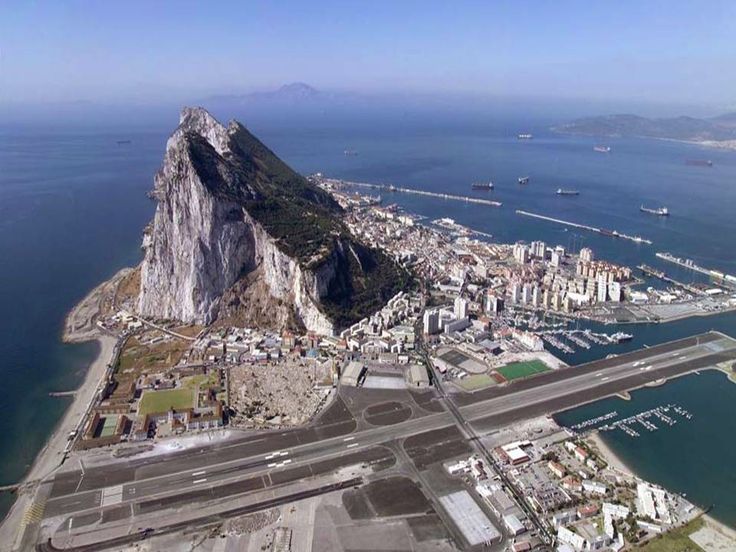Gibraltar is a British Overseas Territory located at the southern tip of the Iberian Peninsula. It covers 6.8km2 of rugged limestone promontory known as the Rock of Gibraltar plus a narrow coastal plain. The name derives from the Arabic Jabal Tariq, meaning Mountain of Tariq, after the Moorish commander Tariq ibn Ziyad who captured it in 711. Gibraltar has about33000 residents. English is the official language, while Llanito—a blend of Andalusian Spanish and English—is widely spoken. Alcohol is legal from age18 and sold in licensed premises; narcotics are prohibited. Gambling is permitted in licensed casinos operated by the Government under strict regulation. The highest authority is the British monarch represented by a Governor, and executive power rests with the locally elected Chief Minister. Gibraltar has no standing army; defence is provided by the United Kingdom.
History
Human presence on the Rock of Gibraltar dates back over5000 years, with Neolithic tools and cave art in Gorham’s Cave complex indicating prehistoric settlement. Phoenician traders visited in the first millennium BCE, referring to it as one of the Pillars of Hercules guarding the entrance to the Mediterranean. Carthaginian and later Roman influence followed, though no large settlements remained. After the fall of the Western Roman Empire, the region passed through Vandal and Byzantine hands until the arrival of Visigothic rulers.
In711 CE Tariq ibn Ziyad landed with Moors from North Africa, seized the Rock and initiated nearly eight centuries of Islamic rule. The Moorish Castle, begun in the 8th century and expanded over time, stands as a testament to this era. In1309 the Crown of Castile captured Gibraltar, only to lose it back to the Moors in1333 after a prolonged siege. The port city remained contested until the Reconquista in1462 when Christian forces restored Castilian control.
Spanish rule continued until1704, when a combined English and Dutch fleet seized Gibraltar during the War of the Spanish Succession. The 1713 Treaty of Utrecht ceded it “in perpetuity” to Britain, though Spain retained fishing rights. Britain fortified the Rock over the 18th century, using it as a naval base. During the American War of Independence the territory withstood the 1782 Great Siege by Spanish and French forces, supported by a tunnelled defensive system that remains partly intact.
The 19th century saw expansion of the naval dockyard and arrival of civilians from Malta, Sicily and Britain, creating a multicultural population. In World War II civilian evacuation left Gibraltar empty of residents for the first time, while the Rock’s tunnels housed hospitals, ammunition stores and garrisons. The territory served as a key staging post for Allied convoys crossing the Mediterranean.
After the war Gibraltar’s inhabitants pressed for civil rights. A 1967 referendum saw 99 percent vote to remain under British sovereignty. Gibraltar regained self-government in1969 with its own parliament and constitution. Spain closed the land border from1969 to1985, isolating the territory but boosting its maritime links. Gibraltar joined the European Economic Community through UK membership in1973 and left with Brexit in2020, now participating in the Schengen Area for passport-free travel with Spain.
Today Gibraltar balances strategic defence installations, thriving financial services, tourism and unique environmental conservation, all while maintaining its distinct identity born of centuries of contest and cooperation.
Industry
Gibraltar’s economy relies on finance, shipping, tourism and online gaming. The territory hosts over300 financial services firms under robust regulatory frameworks. The Port of Gibraltar is a major bunkering hub with world-record fuel sales. Gibraltar’s Gibraltar International Airport manages cross-border traffic. The territory is home to several online gaming operators licensed locally, making it a leader in regulated digital entertainment. No major manufacturing brands originate here, but the port and gaming industries hold world records in bunkering volume and licensed operators per capita.
Religion and Ethnicities
Christianity predominates at74 percent (mostly Roman Catholic), followed by Islam at8 percent, Hinduism at7 percent, Judaism at4 percent and other faiths7 percent. Ethnically, Gibraltarians of Genoese, Maltese, Portuguese and British descent form about80 percent of the population, while Moroccan, Indian and British expatriates comprise the rest. Religious festivals include the Procession of Our Lady of Europe on May15 and Eid al-Fitr celebrations in the Muslim community.
Wars and Conflicts
Gibraltar has endured numerous sieges, including the Great Siege of 1779-1783. In World War II it was a key Allied fortress and suffered aerial bombing. No armed conflicts have occurred on its soil since, though it remains strategically important to NATO. Military cemeteries at North Front and Trafalgar House commemorate fallen soldiers. No modern terrorist attacks have targeted Gibraltar directly, but security remains vigilant against maritime threats.
Standard of Living
Gibraltar boasts one of the highest GDP per capita in the world. Healthcare and education services are publicly funded. Transparency International ranks the territory high for low corruption, and the Human Development Index places it among developed economies. Housing and cost of living are high due to limited land availability.
Medicine
The Gibraltar Health Authority operates the St Bernard’s Hospital with emergency services, general practitioners and specialists. Pharmacies open Monday–Saturday 09:00–18:00 and Sundays 10:00–13:00. Tourists should carry European Health Insurance Card or travel insurance. Tap water meets WHO standards.
Sport
Football is popular, with Gibraltar FC competing in UEFA competitions since2013. Rock climbing and caving in the Upper Rock Nature Reserve draw enthusiasts. Gibraltar holds international cricket and basketball matches. Locals participate in regattas and triathlons. Gibraltar sent athletes to the Commonwealth Games; no Olympic team competes separately.
Holidays
National Day on September10 features street parties and fireworks. Carnival in February brings parades. Easter Holy Week includes traditional processions. Christmas on December25 has midnight mass and festive markets.
Traditions
Gibraltarians greet with strong handshakes. Street names in English and Spanish reflect the bilingual heritage. Tourists should remove hats in churches and avoid loud behaviour on National Day parades.
Interesting Facts
Barbary macaques on the Rock are Europe’s only wild monkeys. The Upper Rock shelters over1200 WWII tunnels. Scenes from the James Bond film For Your Eyes Only were shot here. British royalty regularly visits. The Rock’s Echo Engineer Record Centre preserves historic military engineering.
Money
The Gibraltar pound is pegged at par with the British pound sterling and both circulate locally. Credit and debit cards are accepted widely; ATMs are plentiful. Currency exchange at banks and the airport offers good rates. Cash is preferred at small shops. Tipping10 percent in restaurants is customary.
Household Details
Electricity is230 V at50 Hz. Plugs are typeG. Gibraltar Telecom provides 4G and expanding5G mobile coverage. Public Wi-Fi is available in many areas.
Clothing
Smart casual attire suits most venues. In summer lightweight clothing and sun hats are recommended. Shorts and short skirts are acceptable, but cover shoulders in churches. Closed-toe shoes are advised for hiking the Rock.
Tourism
Tourism revolves around the Rock of Gibraltar with cable car rides to the summit for panoramic views of Spain and Africa. Guided nature walks explore botanical gardens and WWII tunnels. The Great Siege Tunnels and Moorish Castle offer historical insight. Dolphin-watching boat tours operate daily in the Bay of Gibraltar. Europa Point lighthouse and the Shrine of Our Lady of Europe mark the southernmost tip. Main Street presents duty-free shopping, local eateries and the Gibraltar Museum tracing 300 000 years of history. Birdwatchers observe thousands of migratory raptors passing through the nature reserve each spring and autumn. Scuba-diving excursions explore underwater wrecks and artificial reefs. Rock climbing routes on the east face attract experienced climbers. Casinos along Casemates Square provide evening entertainment. Local festivals showcase music, dance and cuisine.
Types of Tourism
Heritage tourism at castles and tunnels. Eco-tourism for bird migrations and botanical trails. Adventure tourism with climbing and caving. Coastal tourism for boat trips and marine life. Shopping tourism in duty-free areas.
List of Tourist Attractions
Rock of Gibraltar – limestone ridge with views of three continents
Great Siege Tunnels – 18th-century defensive complex
Moorish Castle – medieval fortress founded in early 14th century
Europa Point – southern tip with lighthouse and shrine
Gibraltar Nature Reserve – protected habitat for flora and fauna
List of Non-Tourist Attractions
Naval Signals Station – active military facility at O’Hara’s Battery
Airport Runway – aircraft taxi across main road at crossing
Windsor Bridge Gardens – quiet park used by locals
Governor’s Residence – private official home on South Barrack Road
Local Fish Market – early-morning catch auctions
Local Cuisine
Calentita – chickpea flour pancake akin to Italian farinata
Panissa – fried chickpea dough fingers
Rosto – meat stew with pasta
Potaje de garbanzos – chickpea and chard stew
Local wines and sherry complement meals. Breakfast07:00–09:00, lunch13:00–15:00, dinner19:00–22:00. Service charge may apply; tipping5–10 percent is appreciated. Food hygiene standards are high.
Why Visit
Gibraltar offers unique cultural fusion, dramatic scenery, rich history and Mediterranean climate all within a compact territory.
Safety for Tourists
Crime rates are low and violent crime rare. No dangerous wildlife. CCTV covers urban areas. Terrorist threat is minimal. Healthcare and hygiene standards meet EU norms. Gibraltar welcomes visitors of all backgrounds equally.
Tourist Infrastructure
High standards of service in hotels and restaurants. Staff commonly speak English and Spanish. Tourist information centres and guided tour operators are well established.
Entry Rules
Gibraltar shares an open land border with Spain; passport control at Spanish side. EU and UK passport holders enjoy visa-free entry. Customs prohibit narcotics, firearms and large sums of undeclared cash.
Transport
Local buses and taxis cover all districts; fares paid onboard or by card. Cable car operates year-round. Crossing the runway by foot is a unique experience. No rail links.
Automobile
Driving is on the right. Car hire available at the airport. Parking in multi-storey car parks and street meters. No toll roads. Zero alcohol limit for drivers. Speed limits30 km/h in town and50 km/h on the airport approach. Traffic cameras enforce limits. No winter tyre requirement. Small cars recommended for narrow streets. Fines start at50 GBP.
Noise Regulations
Quiet hours from23:00 to07:00 in residential areas. Construction work prohibited at night. Public events end by00:00.
Daily Budget
Budget travel costs70–90 GBP (85–110 USD) per day. A comfortable stay is150–200 GBP (180–230 USD) per day. Luxury experiences exceed250 GBP (290 USD).
What Is Not Recommended or Strictly Forbidden
Do not fly drones over military areas. Avoid photographing security installations. Public nudity is illegal. Respect religious sites.
Climate
Mediterranean climate with mild winters10–16 °C and warm summers18–30 °C. Best time to visit is April to October for pleasant weather.
Travel Tips
No special vaccinations required beyond routine immunisations. Carry sun protection and comfortable walking shoes. Book cable car tickets online during peak season. Keep some cash for small vendors. Enjoy Gibraltar’s mix of British and Mediterranean charm.
- Gibraltar
- The September 11 Terrorist Attack: How the Tragedy Changed Tourism
- Endemics of Baikal
- Haruto Takahashi Found Pirate Treasure in Madagascar and Rowed It Home
- Tourist places where Hemingway went
- Moab
- And in Africa the mountains are this high
- Daring to Explore Again
- Namibia sees almost double-digit growth
- Borneo
- Ratmanov Island
- Haiti, unfiltered: how to travel smart and fall in love with the country
- Namaqualand Flower Route
- Bosphorus
- Scythians
- The Louvre welcomes Renaissance masterpieces from Naples Capodimonte Museum
- Chukchi
- Around Baikal by Car: A Grand Loop of Siberia’s Inland Sea
- Honduras
- Shakira – Waka Waka (This Time for Africa)












